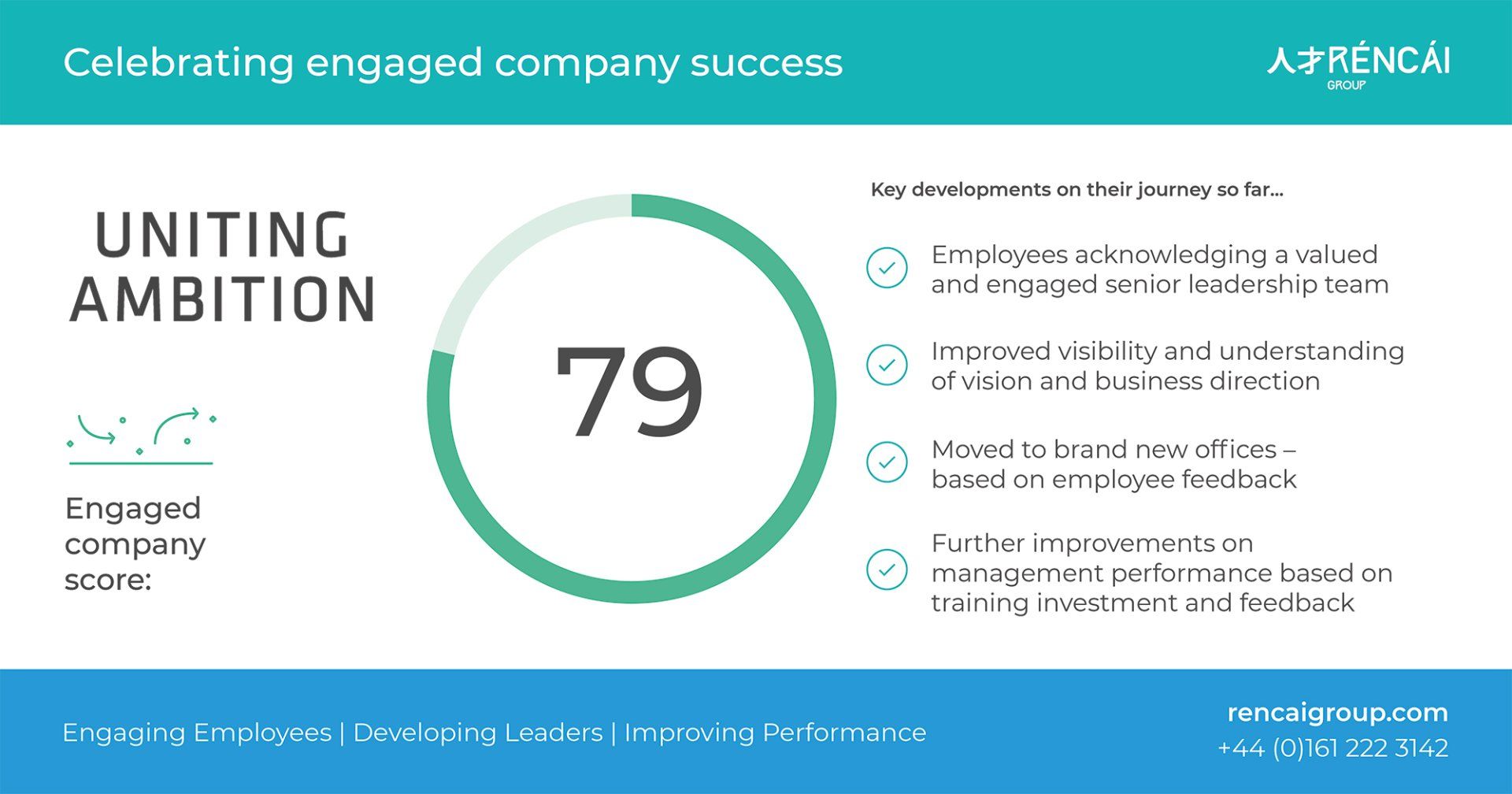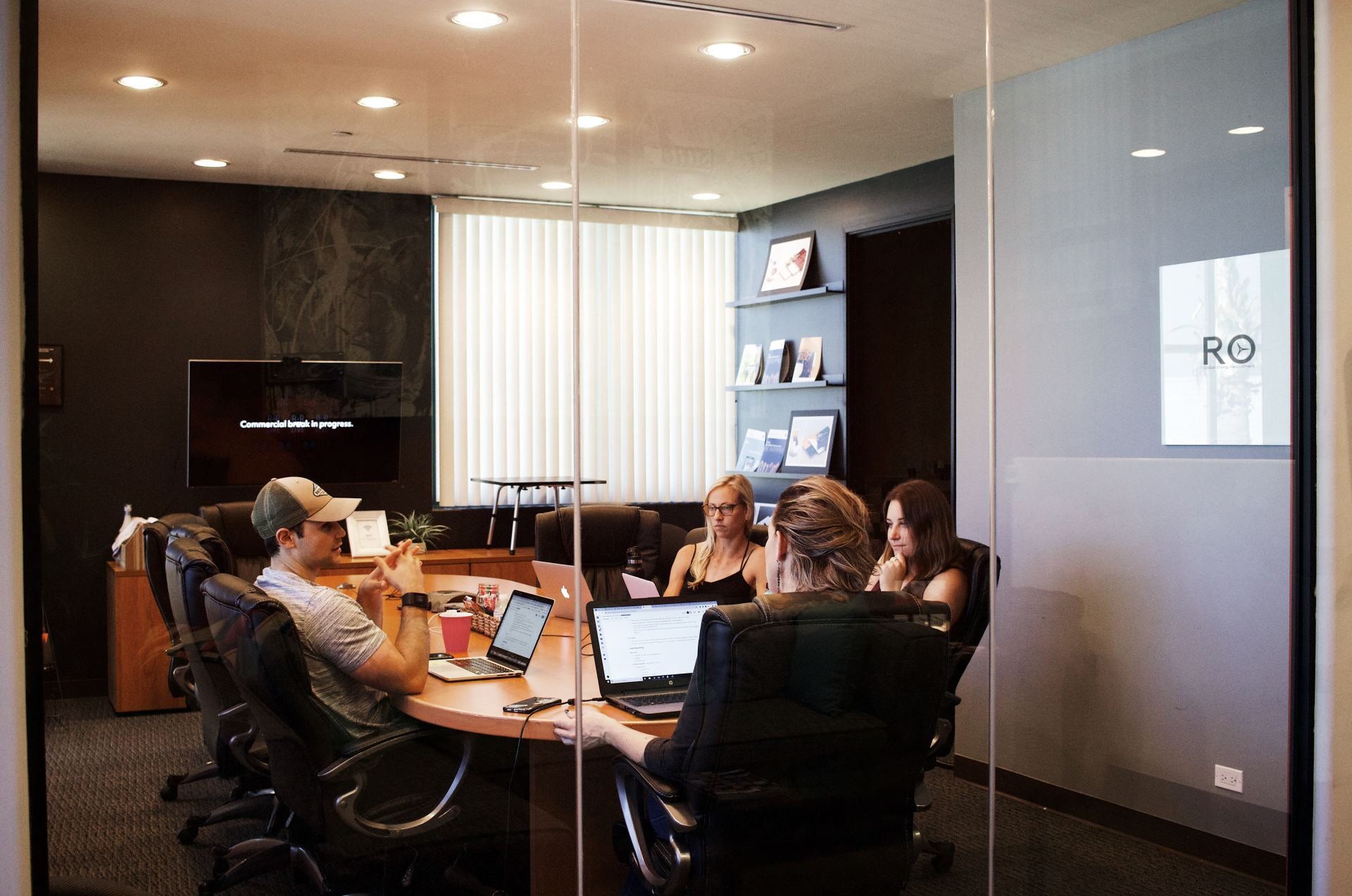Career News and Advice

Uniting Ambition are proud to be awarded an Engaged Employees accreditation from Engagement Multiplier for the 2nd consecutive time. After a year of rolling out new initiatives around engagement, leadership development and consultant performance this award highlights Uniting Ambition's dedication to its employees. Engagement Multiplier highlighted key developments that contributed to Uniting Ambitions high engagement score of 79. Employees acknowledging a valued and engaged senior leadership team Improved visibility and understanding of vision and business direction Moved to brand new offices Further improvements on management performance based on training investment and feedback Uniting Ambition are currently hiring so if you want to join a business that puts employee engagement at the heart of everything they do then apply now .

Search results produced by the internet can be the difference between a hiring company or a recruiter giving you a job offer or a job rejection. We live in a very digital world. The vast majority of job applications nowadays are online and hiring managers regularly turn to Google in their screening process. But they aren’t searching for the best interview questions to ask. No, they are searching for you. So what exactly does Google say about you? First, let’s hope Google knows who you are, then let’s hope you made the right impression. One of the first things to show up will most likely be your social media profiles. Of course, what you do in your own time should have no bearing on your application but what is the overall impression that others might get from your social media profiles? Are your posts well written, using correct spelling and grammar? Is it mostly positive? Even if your profiles are set to private, they are still findable. A single like or share means people outside of your friends list can still view it. Therefore, you need to make sure you know what is showing up in search results and what can be seen by someone who is not on your friends list. Social media can be a blessing or a curse – depending on how well you’re clued up on it. There is a thin line between using it to the best of your advantage, and abusing the power it can have. If you’re in a profession which requires a corporate persona, you should start by creating separate accounts for your own personal use. It’s all well and good having a Facebook, Twitter and Instagram account full to the brim of your night out antics and group selfies, but make sure these are all set to private. That way, the only people who can view these profiles are genuine friends who you have accepted and have given permission to do so. It also prevents your next potential boss from looking you up and being met with everything you don’t want them to see. Can you think of anything worse than making it through the long-winded task of applying and the gruelling interview process, only to be rejected when they see that you’ve been sharing inappropriate videos or that you’ve made a few dodgy comments on your Facebook page? Even if you think it’s all innocent, others may not agree. Don’t set yourself up to fail. As stated earlier; it really could be the difference between a job offer and a job rejection. Another way to stop unwanted attention from important people is to change your handle; this means altering your name on social media, so perhaps only using your first and middle names and removing your surname. It also depends on how rare your name is; if you’re lucky enough to have a name like ‘John Smith’ you can probably breathe a sigh of relief and rest assured that you won’t be found and analysed in great detail. But the downside of having such a common name is that hiring companies won’t be able to easily access you online, and not knowing anything about your online presence may actually be more detrimental to your future job role than if they had seen your social media profiles. If you are 100% certain that your social media profiles are harmless and completely safe, then it may not be necessary to create professional accounts aswell. If you make this choice, you need to be constantly wary of everything you share, broadcast and write online. It isn’t obligatory to keep everything strictly job-related, but steer clear of anything that could be deemed unethical or dishonourable. Another crucial feature to think about is the profile picture you choose to publicise. If you’re going to be promoting yourself through the power of social media, perhaps choose a decent headshot or a graduation photo. Be sure to avoid a selfie with your other half, photos your mates took of you in the club, and anything that is bad quality or blurry. The way in which you promote yourself online can play a big part in your job prospects and ultimately, your future. You could of course, avoid the more social sites all together. For those who work as contractors, those looking for a job, or those who work in recruitment, platforms like LinkedIn are far more useful. The same rules apply; but with these networks you can be much more involved in the job market and open yourself up to potential offers. Using social networking can be extremely rewarding; provided you use it correctly, smartly and efficiently. LinkedIn is another huge part of the recruitment process, so you should make sure that you take full advantage of this. Sign up if you haven’t already, complete your profile and start joining groups and conversations. This way, you can grow and develop your network and perhaps maybe connect with a few worthwhile contacts. This will help employers find you easily when they are sourcing candidates and show that you are passionate about your role to employers who are checking your social media after receiving an application. Apart from checking that your profiles are completely safe, is there anything else you can do to ensure you’re not negatively represented on Google? Securing a decent job in today’s modern market is a lot more than sending out a CV and attending a couple of interviews. Social media has truly taken over; as it is now considered a necessary marketing tool for making yourself stand out and be noticed. The only thing worse than having your social networking profiles analysed and scrutinised by potential employers, is not having social networking profiles at all. If you’ve been living under a rock and you haven’t quite got to grips with the technology-induced world that currently exists, you might want to re-evaluate your priorities. Not being accustomed to the era of social media isn’t necessary the be all and end all; and it’s certainly still simple enough to land the job you want without it. However, social media can boost your chances when applying for competitive roles. It’s one of the most essential advertising techniques to give yourself a prominent brand in the scary job market. The best way to use social media to your advantage is to first outline your skills, previous experience and your personality on sites liked LinkedIn, Facebook and Twitter. Most companies will want clear, concise and correct information that is written in a structured and professional manner; but it is also imperative to try and think outside the box and to push your creative side. Excelling in social media can give you the opportunity to build your own online portfolio which is bound to express what you’re all about. This draws more attention to you as an employee, and will attract recruiters or clients to your services. When it comes to social media, the facts are in the figures. In a recent study done by Career-Builder, 55% of employers who researched job applicants on social media claim they found something that caused them not to hire the applicant. The research found that 48% of recruiters currently use social networking sites to glean information on potential job candidates. However, it isn’t merely employers and recruiters that can use social media for their own benefits. As a candidate, the world of online media should never be ignored. Many employers do use it to promote their brand and their job offers, which allows potential candidates to network with recruitment staff. This information can help you to pick up useful tips on the company and the recruitment process, which will make you come over as a well-informed candidate - so it is well worth making use of. It’s important to ensure that your profile page sells you effectively - it should act as an online CV that allows you to mention your career goals. You should find ways to share your ideas and insights on the industry you are part of. You could create a blog and write articles, contribute to someone else’s blog or website. Or if you are not comfortable writing, you could try your hand at infographics. There are plenty of sites where you can create and share infographics for free, and then there is also slideshare; another tool for sharing ideas. Make sure to share your content with your network and across your social media channels to build that visibility, engage with more contacts and develop your overall image. This is all part of building effective thought leadership. It takes time to get to a respected status, but every single thing you do adds to your profile and builds your professional reputation. This in turn, builds your online presence and ensures that a potential employer can find you and have a great impression of your character. Google can be your friend, or it can destroy your job application. The result is completely up to you.

Whether you work in an office, at home, on a construction site or in a shop, your environment can massively contribute to the way you work and your productivity. The environment of the place that you work can be responsible for your work achievements - or your downfalls. A positive, collaborative, creative work environment is what retains employees in the long run, and motivates them to work harder. So, what are the factors that make up the best possible working environment? Co-worker communication The way that we socialise and communicate at work can be a huge benefit to our lives; or it can be the biggest drawback of our day-to-day routine. Chances are, if employees communicate well with each other, and managers communicate well with employees, the workplace will undoubtedly be much more productive. A work environment with good communication is one where everybody knows each other’s names, employees from all tiers are approachable and friendly, and there is a welcoming familiarity and openness that allows relationships to form beyond the realm of the business’s targets. It’s also essential to understand the perfect balance of having a laugh with your colleagues, and getting the job done to a good quality. Your surroundings If we work in a cluttered, claustrophobic and untidy space, our minds are likely to reflect this and our motivation will suffer on a big scale. Your working surroundings needs to be a representation of the way you prefer to work. If you like to take a somewhat chaotic approach and you tend to be a bit all over the place with your work, but you still get the job done on time; you’ll likely work more effectively in an environment that is busy and bustling. If you prefer to take a step back, steer clear of the limelight and work quietly and efficiently in a calm, neutral space; you’ll probably work best in an open, clean and peaceful setting. There are endless variations of how a work place can look. Similarly, the energy levels of a business can impact the way employees conduct themselves. Great energy can be created by an, attractive, comfortable physical environment. For example, windows allow natural sunlight into an office, which are essential to contributing to a good mood. Also, a clean work environment without much clutter allows employees to focus on their goals. Lastly, an open work environment that is not closed off by cubicles fosters group communication and helps build relationships between employees. Teamwork and acknowledgement It’s important to seek support from your peers, and equally, give those around you any help and backing that they need too. This is where a sense of teamwork is evoked in the work place, and employees will no longer just feel that they’re working for themselves. They are now working towards something bigger than themselves, as a united group. Receiving and giving out acknowledgement to your colleagues is also vital. If someone has done a great job; tell them! They may not win any benefits or physical trophies, but they’ll know that their hard work has paid off, and it’s appreciated. Positive reinforcement can work wonders for the growth and development of a company; especially if it starts from the top down. The way we work can strongly affect our progression levels, but to first understand which working environment you can thrive in, you need to figure out what type of person you are; and how you fit into the business in the grand scheme of things.

When it comes to the dream career, it isn’t all plain sailing. Rejection happens, failure affects us all in one way or another, and sometimes even when we do find a job we end up despising it. So, what is it that entices us to stay put in a career that we’re miserable in? Or stops us from applying for a job at all? Is it that the pay-packet is more attractive than the job prospects? Is it because we get comfortable and we’re too frightened of change? Or, is it that we simply haven’t got the necessary experience or skills to land the job we really want? Regardless of what the reason is, you can’t allow for a bad case of ‘career fear’ to hold you back for a minute longer. It may be said that ‘live to work and work to live’ is the mantra of life, but the philosophy of work doesn’t have to be as bland as this. Work should be a place that you're raring to get to each morning you wake up. Considering we spend half of our lives at the daily grind, we should ensure that it’s something we enjoy and can take a bit of pride in – whether that’s a hot shot IT job in a swanky office, a retail assistant who serves customers, or a graduate working as an intern towards a higher goal. If it's a fear of failure you get when applying for a job; you need to do whatever it takes to snap out of the anxiety of being rejected. The reality is, in a great deal of jobs, you don’t even need particular experience within the field. Hirers are much more likely to be attracted to who you are as a person and how you can make the role your own. In interviews and applications, it’s essential to discuss your previous downfalls and obstacles, because it’s how you overcame them that matters to an employer. Far too many job-searchers are under the impression that experience is the be-all-and-end-all of getting that all-important job offer. This can be a bit of a mind game used by managers who intend on weakening your self-worth so that they can obtain your employment for less than market value. Don’t fall into the trap of de-valuing yourself. If you’ve read the job description and you meet the qualifications, then you’re qualified. Keep your head held high and go for what’s yours. Even if your skill-set and experience doesn’t quite meet the job description; what have you got to lose by sending in an application? Perhaps the reason you haven’t made it to the dream job yet, is because you’re so comfortable in the one you’re already in. We have all been tempted to just stick with the devil we know; but comfort isn’t necessarily happiness. If you know there is a job out there better suited to your needs, you should be working every day to get closer to achieving it. You shouldn’t get content in a job that you’ve already gotten everything out of. Your work life is all about development and progression – so standing still should never be an option. After all, most of us don't shy away from our dream jobs because they're easy. Fear is really a driver of energy and it helps you know whether you're on the right track. It’s common knowledge that anything good in life, any success in life, requires fear in the first place. The goal is to feel the fear and do it anyway. Nothing worth having is easy; as they say. So don’t stand still any longer.

Interviews. The epitome of the nightmare that comes when applying for a job. Yes, interviews can be terrifying. But do they actually need to be? On the bright side, an interview is usually a good sign. Even just getting an interview in some places is worthy of big congratulations. But it’s also important to not lose sight of the end result. An interview determines a lot of things; not just for the employer, but for you as a candidate too. Whilst it is a meeting for the company to analyse more about you, it’s also an opportunity for you to get a vibe of the place, and to ask any questions relating to the role. If you view it as more of a formal meeting rather than an interrogation, your mind-set will be much more at peace, and you can focus on the task at hand rather than letting the nerves eat you up. Most of us know the obvious rules of an interview; dress to impress, sit up straight, engage with a positive approach and ask appropriate questions. But what about the colossal mistakes that you should steer clear of at all costs? 1. Giving one-word answers Giving a one-worded answer to a pivotal interview question is a bit like jumping out of a plane without a parachute – it’s a self-sacrifice that can be easily avoided by using a little common sense. Answering merely ‘yes’ or ‘no’ to any question in any interview is never an option. Even if the question you’ve been asked is a closed question. You should always be reminding yourself to expand on your answers, even if only a little. Giving a one-word answer will suggest that you’re disinterested and lazy; so don’t fall into this trap. 2. Waffling about previous employers Most companies want an overview of your last role and what your responsibilities were. However, what they don’t want is to hear the lifetime sagas about your relationships with your former co-workers or your boss. If you spend valuable time waffling on about how you didn’t quite gel with your last manager, or you thought they were the greatest company in the world to work for, you are bound to give off the wrong impression. When it comes to your previous jobs, keep it short, concise and positive. 3. Being clueless A lack of research about the company or the role will leave you feeling unprepared. You need to be fully up-to-date on the company's presence in the current industry and you should ensure that you fully understand the role on offer. In what way will you fit into the organisations structure? What can you bring to the team? An understanding at this level puts you in a position where you can demonstrate how you can meet the job requirements. 4. Being tardy There are zero genuine excuses for being late to an interview. It’s also the worst possible way to create a first impression on the employer. Being late suggests that you’re sloppy, lazy and not at all serious about the job in question. Even if it takes days to plan your commute, it’s necessary. Do a practice run to the location a couple of days before; and leave yourself a few hours on the day to make the journey. Even if you get there embarrassingly early, you can relax in a nearby coffee shop and do some extra prep. 5. Being a robot Not allowing yourself to transform into a regurgitating robot is an essential skill to master. In any interview, there is such a thing as being too corporate. You should always try to find a healthy balance between professionalism and being laidback. No employer wants to sit and talk to a machine; nor do they want to feel like they’re entertaining a best friend. When appropriate, you can have a bit of a laugh and a joke with your interviewer – but just be aware to bring it back to business when needed.

Although your CV is not the be all and end all of getting the perfect job, it does contribute massively to your initial application process. Companies and hiring managers will peruse your CV in great detail before even calling you in for a face-to-face interview. Ultimately, your CV is responsible for the first impression you give to whoever is in control of offering you a job – and as we all know, first impressions count for everything. There are a lot of simple blunders that you can easily make when producing your CV; and there are also a lot of essentials that you need to include for your CV to be a roaring success. Firstly, it’s imperative that you don’t over-do it. No one has got the time or the patience to sift through ten pages of your life achievements; most of which have no relevance to the job you’re applying for. Keep it to two pages – maximum. Employers will respect that you have the ability to outline the most important parts of your experience and skillset to demonstrate on your CV. For every single job you apply for, you should be creating an entirely different CV. Each application should be different, and this includes your CV content. You should be tailoring your CV to suit the specific role you’re after. Sending out multiple identical CV’s in bulk is perhaps the biggest mistake you can make when looking for a job. Companies will end up with the same versions of it; and you’ll look desperate and fickle. Researching about the job you want to apply for should be your first point of call. What is the company’s history? Why do you want to work for them? What can you bring to the business that your competitors cannot? Defining the answers to these questions and including them in your application will illustrate your passion for the job, which will stand you in good stead for that all-important phone call. It’s a given that your CV should summarise your skillset and previous experience; but again, it’s easy to fall into the drop of going overboard with this. You should bullet-point a concise list of skills you have acquired and how these skills relate to your application. Your previous experience should be constructed as short, clear paragraphs that relates to the job in question. For instance, if you’re applying to work in retail, don’t bang on for half a page about your work experience in an office. Instead, outline your customer service qualities and any challenges that you have overcome in the workplace. The hardest part of writing a decent CV is attempting to make your personality shine through when you’re essentially listing off where you’ve previously worked. But don’t fall into the trap of going too far when promoting yourself. Hirers don’t want to read clichéd phrases and buzzwords that they’ve heard a million times before. Using words like ‘champion of’ or ‘dynamic’ or ‘elite’ or anything remotely generic won’t get you very far. By claiming to embody qualities like this, yet not backing them up with real examples of how you have previously demonstrated these traits, you’re not setting yourself apart from anyone else. Other aspects of a CV should be common knowledge. For example, not submitting a hand-written CV under any circumstances, including all of your vital contact information at the top of the page, make wise choices when it comes to your references and make it positive. Last but most certainly not least, and perhaps the biggest CV-faux-pas you can possibly make, is not double checking your spelling and grammar. Always get a second, third and fourth opinion before impulsively sending off your CV. Even if you pride yourself on your abilities to use proper grammar and correct spelling, you’d be surprised by how much you miss when simply scanning through your own words. Your CV can make you or break you as a candidate for a job. It's up to you to ensure that it isn't the latter!

Have you spent several weeks applying for a job, surviving a gruelling interview process and gotten your hopes up only to be met with that dreaded rejection phone call? More people experience it than you think. A job rejection will happen to the majority of us at some point in our lives. But whilst it might be soul-destroying, disappointing and feel completely unfair; it isn’t a waste of your time. If you’ve gotten to the point where every post-interview call is eroding your self-esteem or you feel like you’re worthless, you need to either alter your mind-set or modify your tactics. It must be understood that usually, a job rejection is not a personal dig at you. As tempting as it is to let your mind wander back to your school days when the others would choose everyone else and no one would pick you, you can’t let it happen. If you do this, it becomes bigger than a concern; it becomes a psychological fear. You’ve come to associate that phone call with anxiety and an expectation of disappointment. Perhaps it’s not phone calls. Maybe it’s when you go to your email and expect bad news and disappointment. Or you’re still in a job, but you’re just waiting for the message that spells out the end of your term there. Whatever form it shows up in, this kind of anxiety and waiting taps directly into an underlying fear of rejection. Ultimately, positivity is the answer to the doom and gloom that a job rejection brings. Going into a situation with a positive attitude sets the baseline for a fresh start. If there is a solid foundation of optimism for the present and the future, it is hard for rejection to enter your positive mind-set. The trick is to maintain a positive outlook on your future career so that the negativity of rejection will turn into your future opportunity. From the moment you learn that you didn't quite get the job, you have to make good choices. First of all, it's always worthwhile to contact the hiring department or the employee who interviewed you to make some enquiries. By asking for some pointers on what you did that didn't quite work for them, you can develop your interview skills and give yourself more of a chance to improve your future prospects. This also shows initiative and strength; and proves that you don't shy away easily even though you've been shunned. It's essential to take the advice the hirer gives you and work on it further. Odds are, it isn't your CV or skillset holding you back. Usually, these have already been analysed before you're called for an interview. But perhaps you weren't culturally fit for a particular company, or the team you'd be working with are looking for someone with a different approach. In other words, not every issue relevant to the rejection is a fault of yours. A lot of factors can pop up throughout an interview process that result in a change of heart; so the most important thing is to not blame yourself. If anything, you should take it as a blessing in disguise. If the company believed that you didn't belong there for whatever reason, you probably wouldn't have enjoyed turning up to work every day anyway. It's all about perspective, and learning not to dwell for too long over things beyond your control. Yes, you didn't quite manage to land the job. So pick yourself up, figure out what went wrong and take it with you through the next application process. Tailor your CV to each specific job, write a killer cover letter to attach to your application, dress the part, maintain your optimism and stay positive. If you follow these five golden rules of job-hunting, you'll be rewarded with a job offer in no time.

Each one of us has some fond – and some not so fond – memories of their school days. On National Education Day, we are reflecting back to our time spent at school and pondering about the life lessons taught to us throughout the years. Although most of us have moved on from being school pupils and are now in full-time career-focused jobs, we do owe our former schools some appreciation and recognition for the people we became. Yes, we may never have delved back into our algebra books, balanced on an upside-down gymnasium bench or re-read our dusty copies of ‘To Kill a Mockingbird’, but school was a lot more important than we give it credit for. Why? Because it taught us social skills Whether you were a ‘sit on the side-lines’ kind of person, or you mucked in with every little thing; it can’t be denied that school taught us everything we need to know about how to socialise properly. School taught us how to make friends, maintain relationships, be confident around others and how to steer clear of the personalities we clash with. All of these qualities are seen every day in business, and – as most employers will tell you – without decent social skills, you won’t get very far in a job application process. Because it taught us how to take criticism Anyone in any job will vouch for this one – criticism is an everyday part of life. If you aren’t used to receiving backlash or disapproval for work that you’ve done, you’ll find it a struggle to stay afloat in the expansive pool of business. The thing to remember is, criticism is not such a bad thing. Constructive critique can allow us to develop our skills and it gives us an opportunity to grow. Without it, you’ll never move onto the next level of your career. You should learn to accept it, fix it and move past it. Just like you would have done in school when you made a mistake. Because it taught us about ambition Ever since the first year of primary school, we’ve been asked ‘what do you want to be when you grow up’ and every year we likely had a different answer. But this wasn’t a pointless exercise. Even since the age of 4, school has promoted ambition and dreaming in all of us. Although most of us probably didn’t end up being princesses, footballers or mythical creatures, it did allow us to set our own goals. This alone, is the reason we have grown up to surround ourselves with opportunities and possibilities in the world of careers. Because it taught us about failure Not succeeding at a task is a part of life that we all have to become accustomed to. In school, making a few blunders is like second nature. But it’s a good thing – because it prepares us to make errors in the real world too. Because it taught us about success Anyone who claims they didn’t feel a sense of euphoric pride after receiving a sticker or positive praise from a teacher is lying. Reinforcement like this teaches us how to repeat our achievements, and shows us that we do get rewarded for our hard work. Whilst you might not get a physical prize for having a good day at work, it still instils gratification and satisfaction into our thought processes. Succeeding at something feels good – as a kid, and as an adult. Because it provided us with hobbies School isn’t just for exams and mathematical equations. Subjects like art, design, PE, music and drama have given us the chance to freely expand our horizons to places we never could off our own backs. Even in business, having hobbies and interests is essential for us all. Learning how to unwind and how to switch off makes for a more optimistic mind-set. Because it proved how committed we can be Commitment is a huge quality of any job or career. If you aren’t committed to your craft, you’ll lose touch with it and your job will inevitably become tedious and dreary for you. To get through school you had to learn how to grow up, form solid friendships, maintain a social life, turn up on time to every lesson, pass every exam, complete homework every week, make time for extracurricular activities and revise constantly. Now we’re all grown up and working in the real world, we probably look back on it and wonder why we felt so stressed. In essence, it was a walk in the park in comparison to adult life. But at the time, it seemed like the hardest thing in the world. Yet you made it. You got through it. You committed. Because it made us who we are The proof is in the pudding with this one. Our attitude, our drive, our interests and everything else that makes us the person we are was drilled into us from a young age. Of course we all change from day-to-day, but the foundation that makes us our own individual self, began in our early school days. Happy National Education Day to everyone! If you have any fond school memories or if you can think of any other reasons why school has helped mould who you are; leave us a comment and let us know.

Cover letters are often viewed as less of a necessity than a CV – but this is far from the case. A good cover letter can take you from weakness to strength in the eyes of a hiring company. Your CV may be the most perfected, tailored document to ever fall into an employer’s lap, but it isn’t always the ticket to success. A cover letter is your opportunity to explain precisely why you are the right candidate for a specific role. You can go into much more detail regarding the ins and outs of the job; much more than you could on your CV. Whilst cover letters must always remain professional throughout, it’s always clever to think outside the box a little and push your creative side. After all, you want yours to stand out from the other applicants; so including a bit of light-hearted humour and passion is encouraged on a small level. It’s crucial to be inventive and knowledgeable about it; because cover letters can make a promising candidate seem like an uncreative cut-and-paster. Sadly, too many cover letters read essentially the same. It’s your job to diversify yourself and draw in attention from the right people. The most important tip that anyone can hear when producing a cover letter is to not be your own copycat. A lot of people write cover letters as if they were paragraph-form CVs. The fact is, your letter will be attached to your CV, so you can assume that they’ll have a glance at both. Instead, use your cover letter to show personality, passion for the role, your reasons for applying to this particular position, and an interest in the field you are applying to work in. Use it to show expertise, curiosity, and perhaps throw in a few facts about the company – this can go a long way for a candidate. However, this is just the tip of the iceberg when you’re mastering the art of cover letter writing. You need to be able to explain what you have that they need. By being placed into a new job, you’re fulfilling a service; so what can you bring to the table that others cannot? We’ve all heard the term ‘less is more’ and with cover letters, this is absolutely how it should be. You should skip any wordy content and jump right into something juicy. This is also the case for your addressee. Sometimes, you don’t know exactly who will be reading your letter. You should avoid the generic and bland “Dear Hiring Manager” or “To Whom It May Concern” at all costs. If you 100% don’t know who you should be addressing, then don’t address anybody whatsoever. Instead, just get straight into the body of the letter. Your introduction needs to be something snappy, concise and worthy of attention. Starting with something as dull as “My name is...and I am applying for the position as…” will surely see your letter being thrown straight into the bin. The employer already knows this, and you’ll sound inexperienced. Don’t make it too lengthy – as soon as you’ve summed up everything you have to say, end it. There is no use repeating details you have already clarified or summarising with paragraph after paragraph. Employers want you to get to the point and keep them drawn in. If it’s longer than a page, you’re likely to lose them halfway through. Cutting down the information and condensing your letter is all part of the creative process. It’s up to you to understand what goes where, and what doesn’t go anywhere. Writing an effective cover letter is a skill in itself, but it is a skill which will be looked upon with respect and credibility by potential hirers. The best way to develop a worthwhile letter is to plan it, research the company’s background, compose a few drafts, get a professional opinion on it and then write a final version. Don’t act like it is an absolute breeze or a chore which can be dealt with in ten minutes; it will show in your application and it will impact how you are viewed by employers. Don’t fall at the first hurdle by submitting a shoddy cover letter – there’s no excuse!

Securing a decent job in today’s modern market is a lot more than sending out a CV and attending a couple of interviews. Social media has truly taken over; as it is now considered a necessary marketing tool for making yourself stand out and be noticed. The only thing worse than having your social networking profiles analysed and scrutinised by potential employers, is not having social networking profiles at all. If you’ve been living under a rock and you haven’t quite got to grips with the technology-induced world that currently exists, you might want to re-evaluate your priorities. Not being accustomed to the era of social media isn’t necessary the be all and end all; and it’s certainly still possible enough to land the job you want without it. However, social media can boost your chances when applying for competitive roles. Social media is one of the most essential advertising techniques to give yourself a prominent brand in the scary job market. The best way to use social media to your advantage is to first outline your skills, previous experience and your personality on sites like LinkedIn, Facebook and Twitter. Most companies will want clear, concise and correct information that is written in a structured and professional manner; but it is also imperative to try and think outside the box and to push your creative side. If you have your own private Twitter and Facebook page for everyday personal use, you should have additional profiles to use on a professional basis that can be found and analysed by others. Excelling in social media can give you the opportunity to build your own online portfolio which is bound to express what you’re all about. This draws more attention to you as an employee, and will attract recruiters or clients to your services. When it comes to social media, the facts are in the figures. In a recent study done by Career-Builder, 55% of employers who researched job applicants on social media claim they found something that caused them not to hire the applicant. The research found that 48% of recruiters currently use social networking sites to glean information on potential job candidates. However, it isn’t merely employers and recruiters that can use social media for their own benefits. As a candidate, sites such as Facebook and LinkedIn should never be ignored. Many employers do use them to promote their brand and their job offers, which allows potential candidates to network with recruitment staff. This information can help you to pick up useful tips on the company and the job-searching process, which will make you come over as a well-informed candidate - so it is well worth making use of. It’s important to ensure that your profile page sells you effectively - it should act as an online CV that allows you to mention your career goals. It's also a good idea to put your photo in your profile because people are more likely to connect to you if you have one.
graduate advice
Follow us on LinkedIn
press release
Supporting Better Mental Health